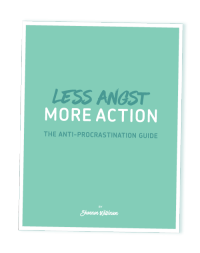(As promised here’s the main article from my March newsletter.)
When you want to do your thing, or even just spend some time figuring it out, does other stuff get in the way? Sometimes it’s “stuff” (picture big finger quotes) like a crammed schedule, tight finances or family responsibilities. Other times, it’s actual stuff, as in physical clutter.
It can show up in different ways. Maybe you’d love to get started on an artsy-craftsy thing, but the spare bedroom, which would make a perfect studio, is full. Or you’d like to sit at your desk and write, but the stacks of papers threaten to fall in on you. Maybe you really want to experiment in the kitchen more, but finding the utensils you need is a nightmare.
Not only does clutter create these physical barriers, it can be physically draining. It can suck your energy until you don’t have any extra left to fan that small spark of creativity you’re protecting inside you.
Clutter Is Surprisingly Complex
Professional Organizer Janine Adams and I have been talking a lot about clutter lately. It seems like it shouldn’t be such a big deal. Pick up the stuff, put it away or get rid of it.
But it’s often not that easy.
Janine works with people and their clutter every day and for most of the people she works with, there’s a lot more going on. It’s not unusual for there to be tears shed in her decluttering sessions. Why should decluttering make someone cry?
Janine explains it like this: The emotions behind the clutter are what that make things so complicated. For many chronically disorganized people, their stuff represents so much more than just stuff. Hanging on to things (or acquiring things) can have emotional roots. It might stem from what they were told when they
were brought up. Or maybe they got in trouble as a child for throwing something valuable away. It might be a finely honed sense of responsibility that prevents them from discarding something. Or it might be what the items in question represent to them. There are many emotional sources of clutter.
Practice
When you think about the stuff that is preventing you from embracing your thing, is clutter on the list? If it is, try these steps to help you understand clutter and gently ease it from your life.
1. Ask yourself, how does clutter block you from your thing.
2. What would you be able to do if you didn’t have this clutter?
3. Choose a physical area where you’d like to focus your attention; it should be large/important enough that you’ll see a difference, but not so big as to become overwhelming.
4. Start with one thing. Ask yourself if you want to keep it or discard it. If the answer’s discard, move on to the next item. If it’s keep, then continue with the questions.
5. If you want to keep it, does it have a home? If it does, put it away. If it doesn’t, yep, that’s right stick with the questions.
6. What’s important to you about this particular thing, what does it represent?
7. Knowing that, is it still important to keep it?
8. Remind yourself of #2 above as often as you need to.
I’d love it if you’d try this and let me know how it goes, or share your favorite way to take care of clutter.
If you’d like more help with decluttering, take a look at this new teleclass that starts March 31, Declutter Happy Hour. The early bird discount ends March 21!


This bit on complexity of clutter is insightful for me at least. I seem to have working clutter and hanging onto for no good reason clutter. It’s helped to learn to let go of things or realize that “I might need it some day” isn’t worth the tradeoff in mess and space. Your great tips will no doubt help me out!
@Michael I’m glad you found it helpful. I like how you make the distinction between “working” clutter and “no good reason” clutter. That will probably be a good way to start clearing space that’s important to you.
Clutter is often a problem for people with multiple interests, because there are so many “someday” ideas represented in the stuff that you hold on to.
I’d love to hear how your decluttering efforts progress. Remember, small, small steps.